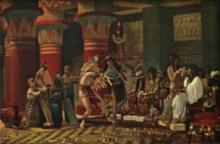The Origin of Gods and Goddesses
Early Egyptians believed that gods and goddesses controlled every aspect of their lives from the birth of children to the growing seasons for crops. Each deity had its place in the circle of life and how it was to unfold. Egyptians believed that making them angry brought about plagues, drought, and famine and when the gods were pleased, the earth was fertile, alive, and without strife.
Egyptians further believed that the world was created from the dark waters of chaos. Mythology states that one day from the dark waters issued forth a mound that formed a hill and on this hill stood Atum; the first god. Atum then created the god of air, Shu, and the goddess of moisture, Tefnut, who in turn birthed offspring that ruled the earth, Geb, and the sky, Nut. Geb and Nut gave birth to the king, Osiris, and queen, Isis, of the world. The good king's brother, Seth, was jealous and desired to rule the world himself and killed the good king. Osiris went to the underworld but before his death the good king fathered a son, Horus. Horus then battled to regain the throne successfully, making himself king of the world and his father king of the underworld.
Each god and goddess created offspring to rule all creatures that walked the earth, both man and beast. These lesser gods and goddesses were also charged with maintaining the balances of nature.
Life and Living
Early Egyptian life was not all that different from how we live today just more primitive in the methods and ways results were achieved. Egyptians farmed along the river banks of the Nile using the fertile soil for plentiful crops. They traded for items that they could not produce themselves; the precursors to capitalism.
They built homes from mud bricks. Homes became communities, which became cities. As society evolved, so did class structures defining the wealthy, the poverty stricken and the middle class. Hierarchies developed bringing forth kings and queens along with conquests and submissions.
Religion was born and cultivated as a way of understanding the frightening and explaining the unexplainable. Religion also generated political control granting those in power a method to rule by when character was not enough. Egyptians built a society that worked for them. Their lives and survival were affected by many of the same problems that afflict modern-day societies.
